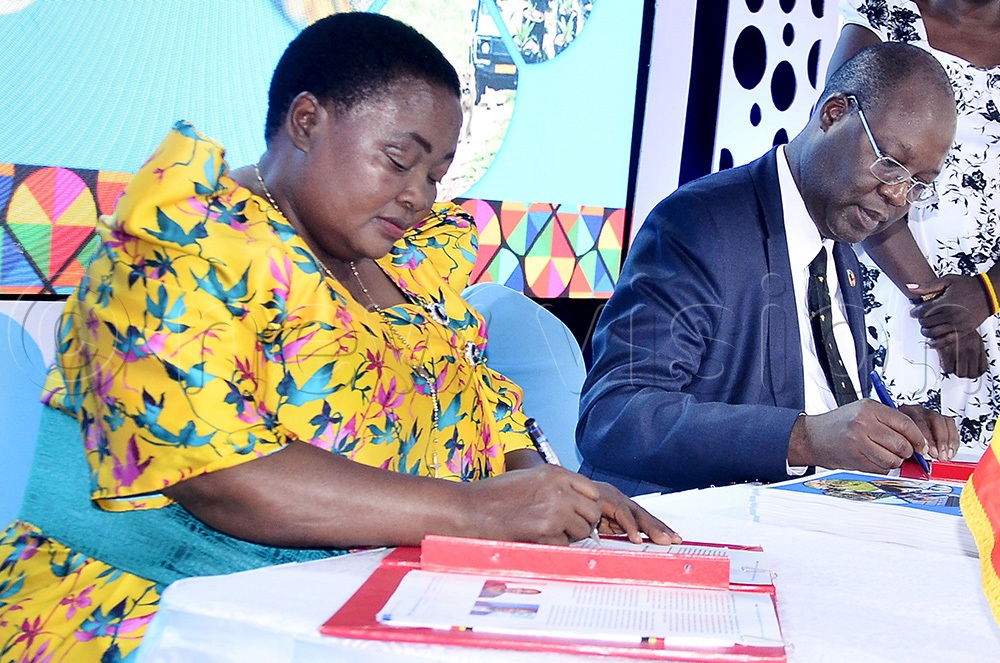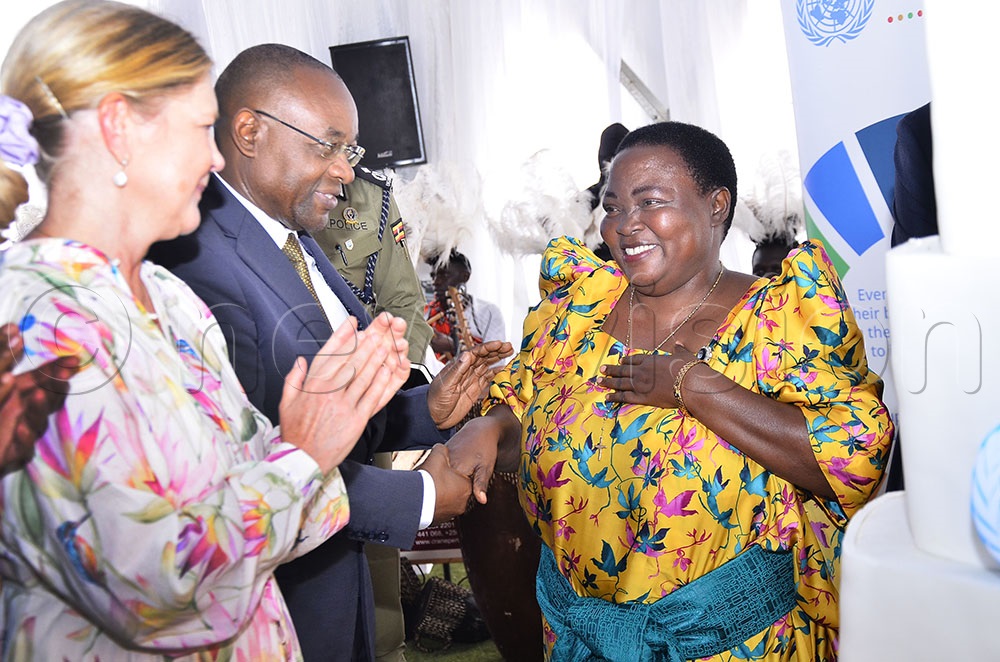Uganda, UN sign pact on inclusive development
After penning the pact, Nabbanja, who represented President Yoweri Museveni, said that Vision 2040 and the Fourth National Development Plan (NDP IV) provide the roadmap for Uganda’s leap into modernity.
The UN Resident Coordinator in Uganda, Leonard Zulu (left) and Prime Minister Robinah Nabbanja launch the UN-Uganda sustainable development cooperation framework 2026 to 2030 at Kololo Independence Grounds in Kampala. (Photo by Ronnie Kijjambu)
_____________________
Uganda and the United Nations have penned a pact aimed at linking the country’s blueprint - the National Development Plan IV, with the global body’s Sustainable Development Goals (SDGs).
The UN Sustainable Development Cooperation Framework for 2026–2030 was signed on Wednesday, October 22, at the Kololo Independence Grounds in Kampala.
Robinah Nabbanja, the Prime Minister, signed on behalf of Uganda, while Leonard Zulu, the United Nations Resident Coordinator, signed on behalf of the UN.
Prime Minister Robinah Nabbanja (left) and the UN Resident Coordinator in Uganda, Leonard Zulu sign an agreement during the United Nation 80th anniversary and the launch of UN Uganda sustainable development cooperation framework 2026 to 2030. (Photo by Ronnie Kijjambu)
After penning the pact, Nabbanja, who represented President Yoweri Museveni, said that Vision 2040 and the Fourth National Development Plan (NDP IV) provide the roadmap for Uganda’s leap into modernity.
“Our task is to create jobs, raise household incomes, build industries, protect the environment, and secure peace and stability,” she said.
Nabbanja further added that the Ugandan government’s plan is to utilise the pillars of NDP IV as engines of the tenfold growth strategy.
“Through this Framework, we are joining national plans with international support to push Uganda forward. A central pillar of our strategy is the Parish Development Model (PDM),” she said, adding that this is not theory.
“It is practical economics that we have promoted for many decades as we have been working tirelessly to move our people from the subsistence economy to the money economy,” she said, adding that in PDM, they are moving resources and decision-making to the people, a move that has rendered each parish is a unit of wealth creation.
Nabbanja added that the Framework that was signed today brings together all actors under one national vision, meaning that Government, citizens, the private sector, civil society, academia and development partners are moving in one direction.
“Development follows the same principle. When everyone works in unison, duplication is avoided, resources are saved, and results come faster,” she said.
Raphael Magezi, the Local Government minister, said that over these decades, the UN has stood with Uganda as a trusted partner and partner of choice.
“It has supported us through humanitarian response, governance reforms, social protection, and sustainable development initiatives.”
UN's Zulu said that the framework builds on Uganda’s steady progress - from achieving medium human development status to meeting two of the three criteria for graduation from the Least Developed Countries category.
“It aligns squarely with Vision 2040, the Fourth National Development Plan, Agenda 2063, the 2030 Agenda for Sustainable Development and the Pact for Future,” he said.
He added that the Cooperation Framework focuses on three strategic priorities, which include: Transformative and Inclusive Human Development, Sustainable Ecosystems and Climate-smart Growth and Integrated, Inclusive, and Rights-based Governance.
“Across these strategic priorities, we will work differently - focusing on catalytic changes that can unlock Uganda’s potential in line with Uganda’s ATMS (Agro-industrialisation, Tourism, Mining and mineral resources and science, technology and Innovation),” he said.

The Swedish Ambassador to Uganda, Maria Hakansson (left) chats with the Prime minister, Robinah Nabbanja (right) during the launch of UN Uganda sustainable development cooperation framework 2026 to 2030 at Kololo Independence Grounds Kampala. Center is the minister for Local Government, Raphael Magyezi. (Photo by Ronnie Kijjambu)
He added that their focus will be on Uganda’s transformation through the six transitions for the acceleration of the Sustainable Development Goals. These include: food systems, energy, digital connectivity, transformative education, jobs and social protection, and climate and environmental action.
“This Cooperation Framework is not only a call to work but to act differently. We must act as one - across Government, UN agencies, and all development actors - to ensure our collective efforts produce real impact. We must finance development differently, bringing together public, private, and innovative financing to unlock Uganda’s growth pathways,” he said.
UN turns 80 years
Zulu further noted that as partners mark the signing and launch of the Cooperation Framework, they should also take a moment to celebrate the United Nations Day 2025.
“On Friday, 24 October 2025, the United Nations marks its eightieth (80th) year since its founding in October 1945. As our organisation turns eighty, we are not only marking history but renewing our commitment to the UN Charter,” he said, adding that UN@80 is a moment of reflection and hope - to modernise how we work, deepen trust, and deliver greater impact.
Globally, the UN is advancing the ‘Pact for the Future’ to strengthen peace, development, climate action, and digital cooperation.
“Here in Uganda, the UN@80 initiative is already taking shape: from using data and foresight to guide national planning, including the Cooperation Framework, to embracing innovation, partnerships, and the quintet of change, which are data, digital, foresight, innovation, and behavioural science.”
These efforts have helped the UN anticipate challenges, respond faster, and work more closely with all partners. In relation to the UN moving to more cost-effective duty stations, we have identified opportunities for Uganda, such as hosting additional UN functions at our Regional Service Centre here in Entebbe.
“This is a reminder that the UN@80 reforms are not abstract – they are happening here, with Uganda as a partner in shaping the UN of the future,” said Zulu, adding that combining UN Day 2025 and the Cooperation Framework launch is more than a delivery milestone but a joint celebration of the spirit that gave birth to the United Nations.